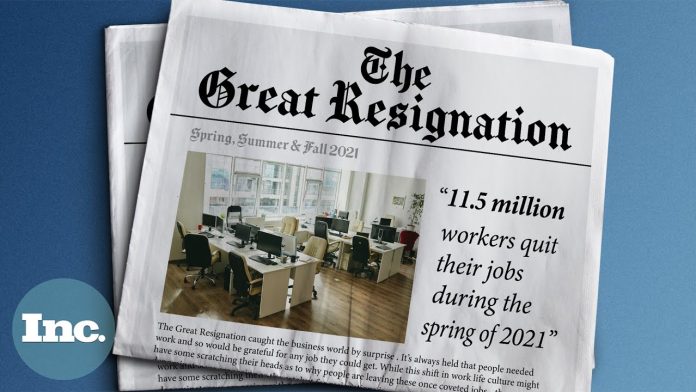The “Great Regret” is the latest workplace trend to sweep the US, with the majority of professionals who quit their jobs last year wishing they could get a do-over, according to a new survey. 2022 was another record year for quitting — 4.1 million workers left their jobs in December, bringing the grand total for the year to over 50 million. Roughly 47 million quit the year before, citing higher pay and better working conditions as incentives for their exit. Now, 8 out of 10 professionals who left their jobs regret their decision, a new Paychex study finds.
Paychex surveyed 825 employees who quit during the “great resignation” and 354 employers to analyze the impact of the quitting spree and gauge employees’ job satisfaction. They found that mental health, work-life balance, workplace relationships and the chance to get rehired all suffered as a result.
Gen Zers are struggling the most
According to Paychex, Gen Z workers reminisce about their old jobs the most. A whopping 89% of Gen Zers say they regret quitting, and as a result, their mental health is on the decline. “The ‘great resignation’ has led to much regret by employees seeking new opportunities. Among those regrets, employees were most likely to miss their co-workers,” Jeff Williams, vice president of enterprise and HR solutions at Paychex, tells CNBC Make It. “These friendships create a sense of community among employees, creating a positive company culture — another thing employees missed about their previous job.” “Our research found that 9 in 10 people reported changing industries after they resigned, and professionals who changed industries were 25% more likely than workers who remained in the same industry to regret their choice. Gen Zers were most likely to miss working in the office, and Gen Xers missed the work-life balance from their previous jobs the most.”
Seemingly, the job perks, benefits, and culture that caused young workers to join the great resignation aren’t enough to keep them satisfied. “Despite satisfaction with mental health and work-life balance influencing many resignations, only about half of respondents from our survey said they are satisfied with their mental health (54%) and work-life balance (43%) in their new workplace. Unfortunately, Gen Zers reported the lowest levels of positive mental health and work-life balance.”
No loyalty, no leeway
While the majority of employers say they’re open to rehiring job-hoppers, some are more hesitant, questioning the loyalty of boomerang employees. When asked if they would be willing to rehire employees that left during the great resignation, 27% of employees said yes and that they’ve already rehired at least one former employee. Forty-three percent said yes, but they have yet to rehire, and 30% said no.
“Anecdotally, we believe that more employers than ever are open-minded to the idea of “boomerang” employees returning to companies,” Williams explains. “Tight labor markets, specialized skills, time-to-performance, and knowing the quality of work expected are all cited as reasons by hiring managers. Those with hesitancy to re-hire highlight loyalty, expected compensation, and underlying suspicion of the employee’s motives.” “Many employers either want to give or have given people their jobs back, with medium-sized businesses the most likely to have done so already. But for others, workplace loyalty seems to keep employers from welcoming them back at all. Returning employees received a 7% raise, but 38% of employers were unwilling to offer new benefits to former employees. Nearly a third of employers won’t consider giving people their jobs back, and blue-collar employers are 17% more likely than white-collar employers to feel this way.”
Turning over a new leaf
It’s natural to spend time relieving the good old days, but Williams advises workers to not dwell on the past for too long. “Nostalgia is the enemy of growth. Be realistic and move on if your former employer won’t rehire you. Recognize your value, be confident in who you are and move forward.” As employees figure out how to turn over a new leaf, Williams suggests “starting with a fresh perspective about what you control.” “For example, you control having a trusted friend peer review your resume. You control making connections on LinkedIn. You control going to networking events, taking a night course to better your skills and giving yourself grace in your search.”
Williams also says that workers should try to avoid job-hopping in the future to put “stability” back on your resume, and that though things may seem bleak now, it won’t last forever.
“The great resignation changed not only the workplace but also the minds of those seeking better work opportunities. The good news is that there’s hope for job hoppers who have had a change of heart about their decision to resign. Many employers are willing to rehire people and improve their benefits, too.”
CNBC























